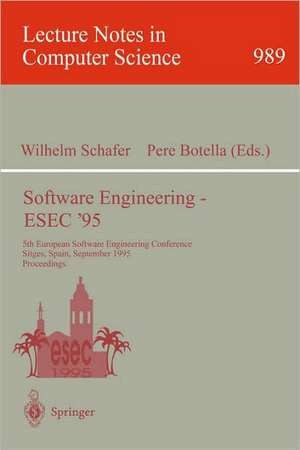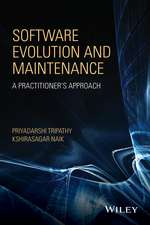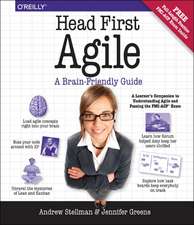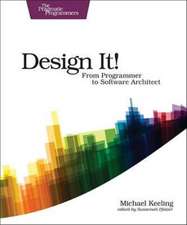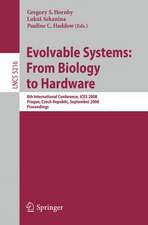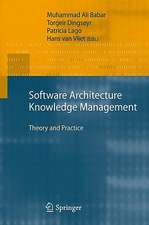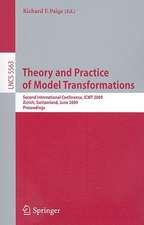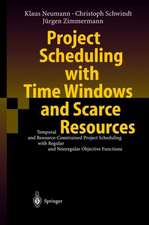Software Engineering - ESEC '95: 5th European Software Engineering Conference, Sitges, Spain, September 25 - 28, 1995. Proceedings: Lecture Notes in Computer Science, cartea 989
Editat de Wilhelm Schäfer, Pere Botellaen Limba Engleză Paperback – 13 sep 1995
The ESEC conferences are the premier European platform for the discussion of academic research and industrial use of software engineering technology. The 29 revised full papers were carefully selected from more than 150 submissions and address all current aspects of relevance. Among the topics covered are business process (re-)engineering, real-time, software metrics, concurrency, version and configuration management, formal methods, design process, program analysis, software quality, and object-oriented software development.
Din seria Lecture Notes in Computer Science
- 20%
 Preț: 1061.55 lei
Preț: 1061.55 lei - 20%
 Preț: 307.71 lei
Preț: 307.71 lei - 20%
 Preț: 438.69 lei
Preț: 438.69 lei - 20%
 Preț: 645.28 lei
Preț: 645.28 lei -
 Preț: 410.88 lei
Preț: 410.88 lei - 15%
 Preț: 580.46 lei
Preț: 580.46 lei - 17%
 Preț: 427.22 lei
Preț: 427.22 lei - 20%
 Preț: 596.46 lei
Preț: 596.46 lei -
 Preț: 381.21 lei
Preț: 381.21 lei - 20%
 Preț: 353.50 lei
Preț: 353.50 lei - 20%
 Preț: 1414.79 lei
Preț: 1414.79 lei - 20%
 Preț: 309.90 lei
Preț: 309.90 lei - 20%
 Preț: 583.40 lei
Preț: 583.40 lei - 20%
 Preț: 1075.26 lei
Preț: 1075.26 lei - 20%
 Preț: 310.26 lei
Preț: 310.26 lei - 20%
 Preț: 655.02 lei
Preț: 655.02 lei - 20%
 Preț: 580.93 lei
Preț: 580.93 lei - 20%
 Preț: 340.32 lei
Preț: 340.32 lei - 15%
 Preț: 438.59 lei
Preț: 438.59 lei - 20%
 Preț: 591.51 lei
Preț: 591.51 lei - 20%
 Preț: 649.49 lei
Preț: 649.49 lei - 20%
 Preț: 337.00 lei
Preț: 337.00 lei -
 Preț: 449.57 lei
Preț: 449.57 lei - 20%
 Preț: 607.39 lei
Preț: 607.39 lei - 20%
 Preț: 1024.44 lei
Preț: 1024.44 lei - 20%
 Preț: 579.30 lei
Preț: 579.30 lei - 20%
 Preț: 763.23 lei
Preț: 763.23 lei - 20%
 Preț: 453.32 lei
Preț: 453.32 lei - 20%
 Preț: 575.48 lei
Preț: 575.48 lei - 20%
 Preț: 585.88 lei
Preț: 585.88 lei - 20%
 Preț: 825.93 lei
Preț: 825.93 lei - 20%
 Preț: 763.23 lei
Preț: 763.23 lei - 17%
 Preț: 360.19 lei
Preț: 360.19 lei - 20%
 Preț: 1183.14 lei
Preț: 1183.14 lei - 20%
 Preț: 340.32 lei
Preț: 340.32 lei - 20%
 Preț: 504.57 lei
Preț: 504.57 lei - 20%
 Preț: 369.12 lei
Preț: 369.12 lei - 20%
 Preț: 583.40 lei
Preț: 583.40 lei - 20%
 Preț: 343.62 lei
Preț: 343.62 lei - 20%
 Preț: 350.21 lei
Preț: 350.21 lei - 20%
 Preț: 764.89 lei
Preț: 764.89 lei - 20%
 Preț: 583.40 lei
Preț: 583.40 lei -
 Preț: 389.48 lei
Preț: 389.48 lei - 20%
 Preț: 341.95 lei
Preț: 341.95 lei - 20%
 Preț: 238.01 lei
Preț: 238.01 lei - 20%
 Preț: 538.29 lei
Preț: 538.29 lei
Preț: 344.42 lei
Preț vechi: 430.53 lei
-20% Nou
Puncte Express: 517
Preț estimativ în valută:
65.91€ • 68.98$ • 54.85£
65.91€ • 68.98$ • 54.85£
Carte tipărită la comandă
Livrare economică 31 martie-14 aprilie
Preluare comenzi: 021 569.72.76
Specificații
ISBN-13: 9783540604068
ISBN-10: 3540604065
Pagini: 540
Ilustrații: XII, 524 p.
Dimensiuni: 155 x 235 x 28 mm
Greutate: 0.75 kg
Ediția:1995
Editura: Springer Berlin, Heidelberg
Colecția Springer
Seria Lecture Notes in Computer Science
Locul publicării:Berlin, Heidelberg, Germany
ISBN-10: 3540604065
Pagini: 540
Ilustrații: XII, 524 p.
Dimensiuni: 155 x 235 x 28 mm
Greutate: 0.75 kg
Ediția:1995
Editura: Springer Berlin, Heidelberg
Colecția Springer
Seria Lecture Notes in Computer Science
Locul publicării:Berlin, Heidelberg, Germany
Public țintă
ResearchCuprins
Demands and perspectives for future software engineers: An industrial viewpoint.- Why we need object databases.- A personal commitment to software quality.- Distributed modeling and distributed enaction of business processes.- Improvise: Interactive multimedia process visualization environment.- Design process improvement case study using process waiver data.- Using a symbolic model checker for verify safety properties in SA/RT models.- Instrumentation of Synchronous Reactive Models for performance engineering.- A formal framework for ASTRAL inter-level proof obligations.- An objective reuse metric: Model and methodology.- Measuring product attributes of object-oriented systems.- Specifying distributed software architectures.- A specification-based methodology for testing concurrent programs.- Dynamic configuration abstraction.- Handling version sets through feature logic.- Integrating incremental analysis with version management.- Graph grammar engineering with PROGRES.- A structured analysis formalism with execution semantics to allow unambiguous model interpretation.- An integrated formal model of scenarios based on statecharts.- Tool support for formal software development: A generic architecture.- The treatment of non-functional requirements in MIKE.- Supporting design rationale for system evolution.- PQL: A language for specifying abstract program views.- An exploratory study of program metrics as predictors of reachability analysis performance.- An empirical evaluation of three defect-detection techniques.- Assessing the quality of large, software-intensive systems: A case study.- The impact of incremental delivery on maintenance effort: An analytical study.- Metrics for quality factors in the LESD project.- Quantitative evaluations of software quality built in with domain-specific disciplines.- Component Programming — a fresh look at software components.- Designing a framework by stepwise generalization.- Object-oriented re-architecturing.
